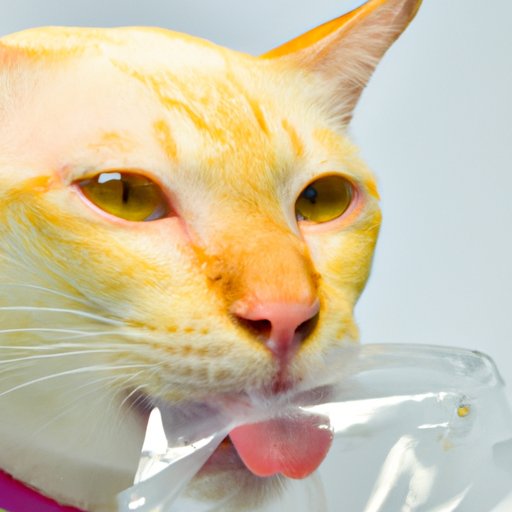Introduction
Have you ever caught your cat licking plastic? This behavior may seem harmless, but it can actually pose serious health risks for your furry friend. In this article, we will explore the reasons why cats lick plastic, the potential health hazards associated with this behavior, and ways to prevent it from happening.
Scientific Explanations
Cats are natural hunters, and their instincts compel them to investigate and play with anything that appears to move or mimic the movements of prey. Licking or chewing on plastic may echo this hunting behavior, making it attractive to cats. They may also develop pica behavior, a condition characterized by the ingestion of non-food items like plastic, caused by a lack of nutrients or boredom.
Studies have shown that cats may crave and ingest non-food items when they are bored or stressed. This may lead to episodes of compulsive chewing or licking behavior. Furthermore, plastic may also smell or taste like food, adding to its appeal to cats.
Behavioral Analysis
Cats may be attracted to different types of plastic, including bags, packaging materials, and water bottle caps. Some cats may be more prone to this behavior, depending on their individual personalities and backgrounds. Some cats may chew or lick plastic during specific times of the day or in specific situations, such as when they are alone at home or when they feel anxious or bored.
Some common items made of plastic that cats may lick are plastic bags, plastic wrap, and plastic water bottle caps. If you notice that your cat is licking any of these, it’s time to intervene.
Health Risks
Cats who frequently lick or ingest plastic may suffer from health problems such as choking, intestinal blockages, and even toxic poisoning. When plastics are ingested, they may tear or obstruct a cat’s digestive tract, leading to serious health issues. Some plastics contain toxins that can lead to organ damage, seizures, and even death if ingested in large amounts.
Exposure to phthalates, bisphenol-A, and other chemicals found in plastics may also cause hormonal imbalances, allergies, respiratory issues, and other health problems in cats. These chemicals can be especially toxic to younger cats, who are more susceptible to environmental toxins.
Ways to Prevent
There are several steps you can take to prevent your cat from licking plastic:
- Keep plastic bags and other plastic items out of your cat’s reach
- Use eco-friendly and non-toxic options such as paper bags or reusable cloth bags instead of plastic bags
- Offer your cat healthy foods and a balanced diet to prevent nutrient deficiencies that can lead to pica behavior
- Provide your cat with stimulating toys and activities to alleviate boredom and anxiety
- Train your cat to stop licking plastic with positive reinforcement techniques and distractions
Cat Owner’s Forum
Here are some tips and stories from other cat owners:
“I caught my cat licking a plastic bag, so I immediately took it away and replaced it with a paper bag. I also provided her with more interactive toys and activities to keep her busy.” – Mary K.
“I had to take my cat to the vet after she ingested a plastic wrapper and vomited for several days. Now I keep all plastic items safely stored, and I also make sure to keep my cat’s space clean and clutter-free.” – Jake R.
“I learned to train my cat with positive reinforcement and distraction techniques. I offered her different types of toys and treats, and now she has stopped licking plastic altogether.” – Sarah C.
Personal Story
My own cat, an adventurous and curious Siamese, used to love licking plastic bags and packaging materials. I was worried about the potential health risks and started experimenting with different solutions. In the end, I found that providing her with a variety of chew toys, interactive games, and healthy treats helped to redirect her behavior. I also made sure to remove any plastic items from her environment, and she hasn’t licked plastic in over a year!
Conclusion
While cats licking plastic may be a common behavior, it can be dangerous and unhealthy for your pet. By understanding the science behind this behavior and how to prevent it, you can keep your cat safe and healthy. Remember to always provide your cat with healthy foods, stimulating activities, and a safe environment to prevent boredom and anxiety. Stay alert and take action if you notice any unusual behavior, and your cat will thank you for it.
